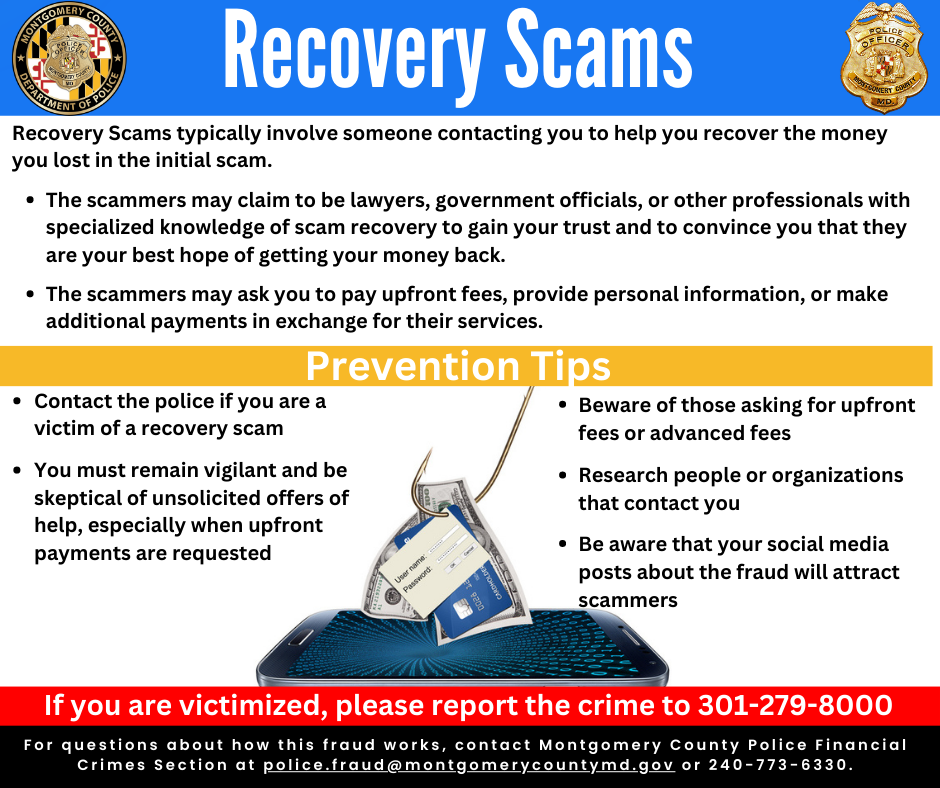Beware of Recovery Scams
You’ve just suffered a scam or fraud, and some friendly stranger offers to assist you in recovering your losses. Their help may have a dark side to it. As if the original loss wasn’t enough, victims must beware of Recovery Scams.
.png)
Regrettably, some unscrupulous individuals and organizations may take advantage of your situation and offer false hope of getting your money back. These recovery scams typically involve someone contacting you to help you recover the money you lost in the initial scam. Perhaps they posted a reply to your social media lament about the theft. They may claim to be lawyers, government officials, or other professionals with specialized knowledge of scam recovery.
However, in most cases, these individuals are simply trying to scam you out of even more money. They may even be confederates of the same criminals that stole your money originally. They may ask you to pay upfront fees, provide personal information, or make additional payments in exchange for their services. Not only will these fees go into their pockets, but the information they gather about you can also be used to steal your identity, leaving you with enormous bills, mortgages, and reputation loss.
Signs of a Recovery Scams
- An unsolicited offer of help from a stranger, particularly in response to your social media posting.
- A request for up-front payment for this "help."
- A request for personal or financial information.
- Pressure to hire the recovery agent.
Prevention Tips
- You must remain vigilant and be skeptical of unsolicited offers of help, especially when upfront payments are requested.
- Legitimate professionals who can help you recover from a scam will not ask for money upfront or pressure you into making hasty decisions.
- Legitimate professionals do not cruise social media to pounce on victims; you must contact them first.
Recovering from the scam
Once you have reported your loss to the proper authorities, you may also want advice and assistance from a reputable non-profit organization specializing in scam recovery:
- Fraud.org is a project of The National Consumers League, and can be reached via email at [email protected], telephone at (202) 835-3323, and by mail at 1701 K St NW., Suite 1200, Washington, DC 20006. Report your incident by filling out an online form at https://fraud.org/.
- Better Business Bureau (BBB), a non-profit organization that helps consumers find trustworthy businesses and charities at https://www.bbb.org/scamtracker.
- American Association of Retired Persons (AARP) Helpline at 877-908-3360 or https://www.aarp.org/money/scams-fraud/.
References:
- Commodity Futures Trading Commission. (n.d.). Don’t be Re-Victimized by Recovery Frauds. Retrieved from https://www.cftc.gov/LearnAndProtect/AdvisoriesAndArticles/RecoveryFrauds.html.
- Federal Bureau of Investigation. (2025 August 13). Fictitious Law Firms Targeting Cryptocurrency Scam Victims Combine Multiple Exploitation Tactics While Offering to Recover Funds. Retrieved from https://www.ic3.gov/PSA/2025/PSA250813.
- Federal Trade Commission. Consumer Advice. (December 2023). Refund and Recovery Scams. Retrieved from https://consumer.ftc.gov/articles/refund-and-recovery-scams.
- Harrar, S. (September 07, 2023). 3 Ways You Can Recover Money Stolen By Scammers. American Association of Retired Persons. Retrieved from https://www.aarp.org/money/scams-fraud/info-2023/recovering-stolen-money.html.
Recovery Scam Flyer
Right-click on the image below and download it to distribute as a hard copy of the flyer.


